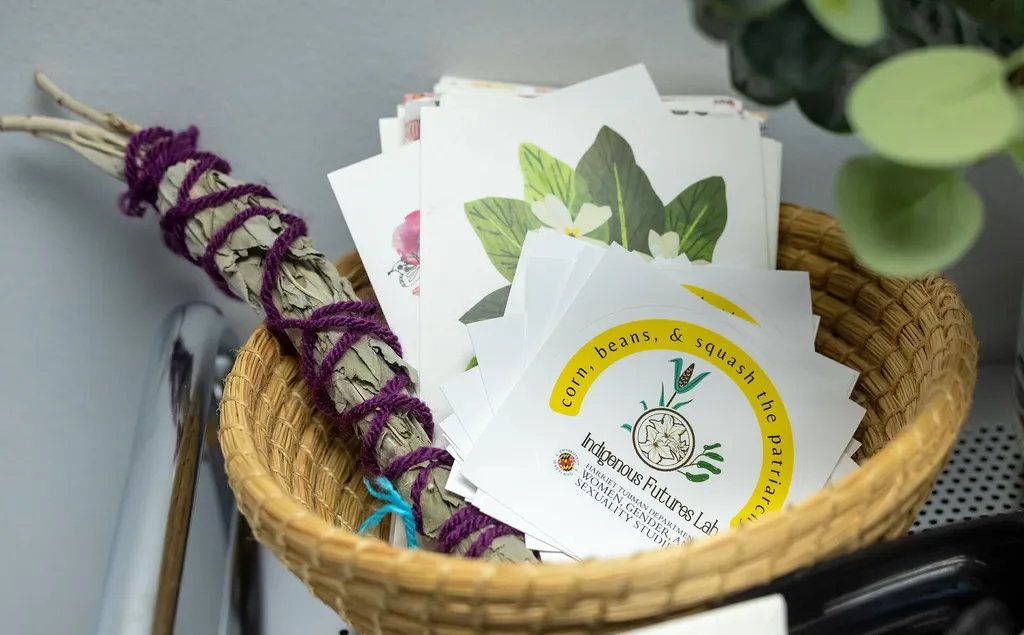- November 20, 2023
- By Jessica Weiss ’05
Shelbi Nahwilet Meissner grew up knowing that the language of her Native American ancestors, Luiseño, was endangered. So she was shocked when, in a linguistics class at New Mexico State University, her professor announced an assignment on Luiseño.
“I took my homework all the way to Phoenix to show my mother,” said Meissner, a new assistant professor in the Harriet Tubman Department of Women, Gender, and Sexuality Studies. “I said, ‘Mom, look, this is our language!’”
Meissner went on to study Luiseño for six years during graduate school at Michigan State University, and eventually taught it in K-12 programs on the reservation of the La Jolla Band of Luiseño Indians in Southern California.
Now Meissner has founded the Indigenous Futures Lab at the University of Maryland, where she’s hoping to do similar “reclamation” work with local Indigenous peoples. One of the lab’s first projects, tentatively named “Piscataway Pathways,” is an effort to help Piscataway communities in their work to locate and secure access to their language and cultural resources, which are currently dispersed in archives across the region. UMD sits on the ancestral lands of the Piscataway People.

The sun-drenched lab on the fourth floor of Susquehanna Hall is anchored by a large wooden table that will host projects and events from feasts and crafting workshops to a speaker series—all centered on Indigenous knowledge. The room features colorful art, a weaving loom, crafting supplies and bundles of tobacco, sage and sweetgrass.
“In this lab, we’re here to use our privilege and access to
honor and serve local Indigenous communities in their struggles for
justice and to co-create futures of flourishing,” said Meissner, who is
also Cupeño. “That requires tools to build community and have
conversations.”
Though Meissner’s ancestors are from California, she was raised in New Mexico and Arizona after her family moved to work for the U.S. Bureau of Indian Affairs. She received her Ph.D. from Michigan State in 2019 and then moved to Washington, D.C. to teach at Georgetown University. After spending her life among Indigenous communities—primarily Diné and Pueblo in the Southwest and Anishinaabe in the Great Lakes, as well as her Luiseño and Cupeño family members—she said she was surprised to find a “profound absence of Indigenous voices” in the national capital region.
“I started thinking about how I could start lifting up the voices of people whose land this is,” she said. “I drafted an initiative, a strategic plan for a lab, and started talking about it to anyone who would listen.”
Meissner was recruited to the university this year as part of UMD’s FAMILE initiative, a $40 million investment to help attract tenure-track faculty from diverse backgrounds. She will begin teaching classes next semester in Indigenous feminisms and Indigenous aesthetics.
Neda Atanasoski, professor and chair of the Harriet Tubman Department of Women, Gender, and Sexuality Studies, said the department was immediately drawn to the idea of creating the lab.
“It’s essential that we’re really paying attention to how the work that we do can affect for the better not just the lives of our students but also beyond—into the community,” Atanasoski said. “What’s so exciting about the lab is that it can be this kind of hub for bridging Indigenous community activism with students and faculty. Hopefully, this is just the beginning of a more robust Indigenous studies presence on campus.”
Indigenous research and evaluation practices often counter Western approaches. For instance, methods like storytelling, ceremonies or art creation are used to ground research in tribal knowledge and worldviews. When knowledge is offered, such as from an elder, it’s common practice for researchers to offer traditional medicines in exchange.

Meissner was recently recognized by the National Science Foundation (NSF) as an Ocean Decade Champion for her work with Indigenous communities in the Great Lakes region, where she has focused on water rights, dam removal and more. For instance, she and her team developed novel ways to evaluate an NSF project to monitor wild rice ecosystems that takes into account the land, animals, plants and other “relatives.”
Last month, 20 students, faculty members and staff showed up for the Indigenous Futures Lab’s first workshop in a “Bead, Weave and Read” series. Meissner said she was heartened by the group's openness to learn the tradition of beadwork, and even more so their willingness to talk—about crafting, creativity and honoring their family members and friends through their pieces. Meissner comes from a family of basket weavers.
“We often say that when you hold a single basket made in an Indigenous community, you’re holding something that overheard so much storytelling—so much knowledge,” she said. “That’s what I want to create here.”
Other ongoing events in the lab include a “Decolonizing Death Café” to build community around Indigenous death and grieving practices, a faculty consortium to explore “Black and Indigenous Environmental Futures,” and a speaker series.
Topics
Research